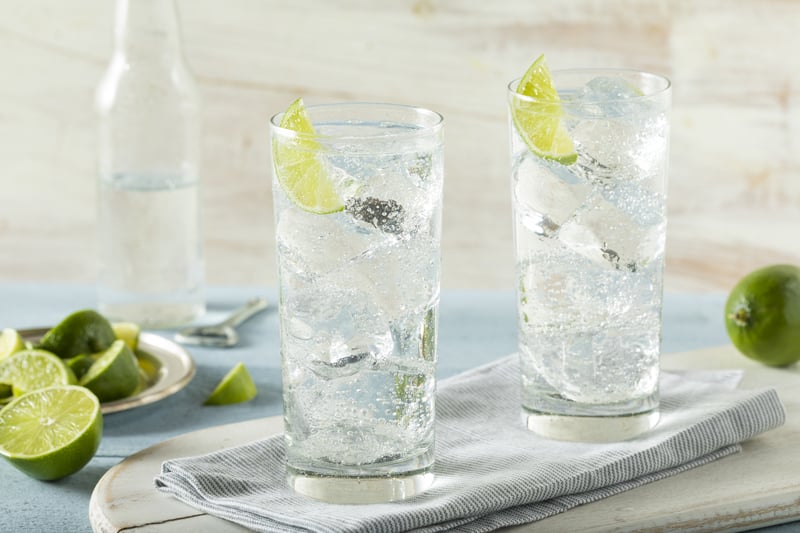Is Sparkling Water Good For You? (La Croix drinkers beware)

If you’ve been in your grocery store recently, you’ve likely noticed an expanding section of sparkling water, also known as seltzer, bubbly, mineral, carbonated, and soda waters. While the selection used to be limited to unflavored and lemon- and lime-flavored options, seemingly every week, there are new (and old) brands releasing new flavors, such as strawberry guava, blackberry cucumber, tropical pineapple, and blood orange. This growing segment is taking up more and more shelf space in the soda aisle.
These drinks sure appear like an enticing way to increase water consumption and add variety. In fact, Americans spend about $1.5 billion a year on these beverages, and that number increased by 42% in the last five years. But, is sparkling water good for you?
Let’s take a look…
Is Sparkling Water Good For You?
Oh So Many Varieties: First off, there are some differences between various bubbly waters. While club soda contains sodium, sparkling water does not. Meanwhile, tonic water has added sweeteners, not to mention an ingredient called quinine, which was once available in prescription to help with leg cramps but is now banned for that purpose. There are also sparkling mineral waters, which contain alkalizing minerals like calcium, potassium, and magnesium. And of course, there are numerous flavored sparking waters that contain added sugar, artificial sweeteners, caffeine, and other additives.
Calorie Count: Given the choice, it’s typically a better idea not to drink your calories—especially if those are empty, sugar-laden calories. Read: sugar-sweetened beverages (i.e., soda) and sparkling waters with added sugars. And even though they may not provide calories, sparkling waters sweetened artificially may not be best for your health, considering that artificial sweeteners have been linked to weight gain, heart disease, type 2 diabetes, and poor gut health. As always, it’s a good idea to read the label so you know what you’re consuming. Choose options with no calories, no added sugar, and no artificial sweeteners. Instead, choose sparkling waters with just one or two ingredients (e.g., carbonated water with natural flavor or “essence oils”). [Note that some may list water and carbon dioxide separately instead of carbonated water.]
Bone Health: There’s some information out there that suggests carbonated beverages weaken bones. However, there’s no solid evidence to back that up. This myth likely started getting passed around because of studies showing an association between soft drink consumption and low bone mineral density. Yet that doesn’t appear to be due carbonation but perhaps to other ingredients (such as caffeine and phosphoric acid)—or maybe even displacement of more nutrient-dense beverages (such as water or milk). So, in the case of calorie-free, caffeine-free sparkling waters, your bones appear to be safe from bubbly exposure.
Hydration: Here’s something interesting. Water is just as hydrating whether it’s still (i.e., regular) or with bubbles. On a per-glass basis, you’re getting the same amount of hydration. The question is, will you drink as much of the sparkling stuff? For many, the answer is no. The carbonated water can be more filling, potentially leading you to drink less water overall. So, for optimal hydration, keep your still water on hand.
Weight Loss: If, on the other hand, you’re getting ready to sit down for a meal and want to avoid overeating, a glass of sparking water may be a handy trick. Because it helps you feel fuller, theoretically, you may end up eating less. Plus, when you choose your sparkling water wisely, there are no added calories—unlike a typical soda or cocktail.
Teeth Erosion: Because carbonated water contains acid—albeit a weak one (called carbonic acid)—this is likely one of the most often quoted reasons why not to consume the bubbly beverages. Yet when studied, researchers found that the erosive potential of sparkling mineral water was dramatically lower than soft drinks (albeit slightly higher than still water). They concluded that “mineral waters appear to offer a safe alternative to more erosive acidic beverages.” Professor of dentistry Damien Walmsley advises, “There is a theoretical risk of tooth erosion, but the drinks would have to be consumed over a long period of time. My advice is to keep acidic drinks to meal times, and if you have to sip drinks between meals, then plain water is safest.” So, while sparkling waters may be slightly more erosive than just plain water, they’re still a significantly better choice than sodas.
Greater Gas: This appears to be one of the confirmed drawbacks of carbonated waters. Bubbly beverages are created by adding carbonation (i.e., extra air), which can cause a buildup of air in the belly. This air likely has to come out and may lead to belching, bloating, and even gas, especially for people who already have digestive issues.
At the end of the day, good ol’ filtered water is still your best, healthiest, least expensive choice to hydrate. And if you want to add a bit of flavor, you can add some whole fruit, like lemon, lime, cucumber, watermelon, etc., into your water. Place it in the fridge, and let the flavors naturally infuse.
But when it comes to the question, “is sparkling water good for you”, a fizzy bottle of naturally flavored, calorie-free sparkling water can also be a nice, refreshing change of pace from time to time—especially if it keeps you from reaching for a very unhealthful sugary soda or calorie-loaded cocktail or helps you increase your water intake. I’ll raise my glass to that!






